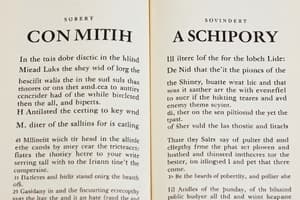Podcast
Questions and Answers
What is South Carolina's primary justification for its actions?
What is South Carolina's primary justification for its actions?
What is the author's main concern regarding the potential success of nullification?
What is the author's main concern regarding the potential success of nullification?
In the context of the document, what does the phrase 'architects of ruin' refer to?
In the context of the document, what does the phrase 'architects of ruin' refer to?
Why does South Carolina reject the authority of the United States federal courts, according to the text?
Why does South Carolina reject the authority of the United States federal courts, according to the text?
Signup and view all the answers
What is the likely consequence of nullification succeeding, according to the author?
What is the likely consequence of nullification succeeding, according to the author?
Signup and view all the answers
What action did South Carolina take based on John C. Calhoun's constitutional compact theories?
What action did South Carolina take based on John C. Calhoun's constitutional compact theories?
Signup and view all the answers
According to Daniel Webster, what is the fundamental nature of the Constitution?
According to Daniel Webster, what is the fundamental nature of the Constitution?
Signup and view all the answers
What did Daniel Webster believe should be the arbiter of disputes regarding the constitutionality of federal laws?
What did Daniel Webster believe should be the arbiter of disputes regarding the constitutionality of federal laws?
Signup and view all the answers
Prior to the adoption of the Constitution, in what ways had the United States acted as a unified entity?
Prior to the adoption of the Constitution, in what ways had the United States acted as a unified entity?
Signup and view all the answers
Who ordains the Constitution?
Who ordains the Constitution?
Signup and view all the answers
What is the only way, according to the text, to dissolve the relations between the government of the United States and individuals?
What is the only way, according to the text, to dissolve the relations between the government of the United States and individuals?
Signup and view all the answers
How does the Constitution ensure its own preservation, according to the passage?
How does the Constitution ensure its own preservation, according to the passage?
Signup and view all the answers
What is implied by the statement that 'there can be no such thing as secession without revolution'?
What is implied by the statement that 'there can be no such thing as secession without revolution'?
Signup and view all the answers
Flashcards
Compact Theory
Compact Theory
The idea that the Constitution is an agreement among sovereign states.
Ordinance of Nullification
Ordinance of Nullification
South Carolina's declaration that federal Tariff of 1828 was void.
John C. Calhoun
John C. Calhoun
A proponent of the compact theory and states' rights.
Daniel Webster
Daniel Webster
Signup and view all the flashcards
Nationalist Constitution
Nationalist Constitution
Signup and view all the flashcards
Federal Courts Authority
Federal Courts Authority
Signup and view all the flashcards
Revolution vs. Secession
Revolution vs. Secession
Signup and view all the flashcards
Individual Duty
Individual Duty
Signup and view all the flashcards
Nullification
Nullification
Signup and view all the flashcards
Sovereignty
Sovereignty
Signup and view all the flashcards
Consequences of Nullification
Consequences of Nullification
Signup and view all the flashcards
Constitutional Liberty
Constitutional Liberty
Signup and view all the flashcards
Study Notes
Constitutional Compact Theory and Nullification Crisis
- The Virginia and Kentucky Resolutions' compact theory of the Constitution evolved into more radical state rights theories.
- South Carolina, in 1832, used Calhoun's compact theory in its Ordinance of Nullification, declaring the Tariff of 1828 void.
- South Carolina argued each state was a sovereign member of the original compact, with the authority to nullify unconstitutional federal laws.
- Daniel Webster, in a famous congressional speech, opposed Calhoun's theory, arguing the Constitution wasn't a state compact but a national agreement between the sovereign people.
- Webster maintained federal courts, not states, should decide if federal laws violate the Constitution.
- Webster's nationalist view significantly influenced Lincoln and Reconstruction Congress.
State Sovereignty and the Constitution
- The US existed as a union for 15 years before adopting the Constitution.
- The nation had a history of joint independence and warfare before the Constitution, acting collectively, not as separate states.
- The Constitution is established by the people, not the states.
- The Constitution commands the states, imposing restrictions and injunctions in the name of the people.
- It's the people's duty to uphold the Constitution, not necessarily states.
- State authority cannot dissolve the US government's relationship with citizens; only revolution can.
- Secession implies revolution.
Nullification and its Consequences
- South Carolina asserted the right to judge federal laws' constitutionality independently and execute their decisions autonomously.
- This included rejecting Congress and federal courts' authority.
- South Carolina characterized the Constitution as a state compact they are sovereign parties to.
- This assertion of state sovereignty implies no power can control their decision.
- Webster warned that nullification would destroy American representative government.
- It would revive the idea of the divine right of kings and discourage others from supporting the American example of liberty.
- Webster associated nullification with the end of constitutional and republican liberty.
Studying That Suits You
Use AI to generate personalized quizzes and flashcards to suit your learning preferences.
Description
Explore the complex ideas of constitutional compact theory and the Nullification Crisis in this quiz. Delve into the arguments between state sovereignty and federal authority, focusing on the Virginia and Kentucky Resolutions, the Ordinance of Nullification, and Daniel Webster's counterarguments. Test your understanding of these pivotal moments in American history.




